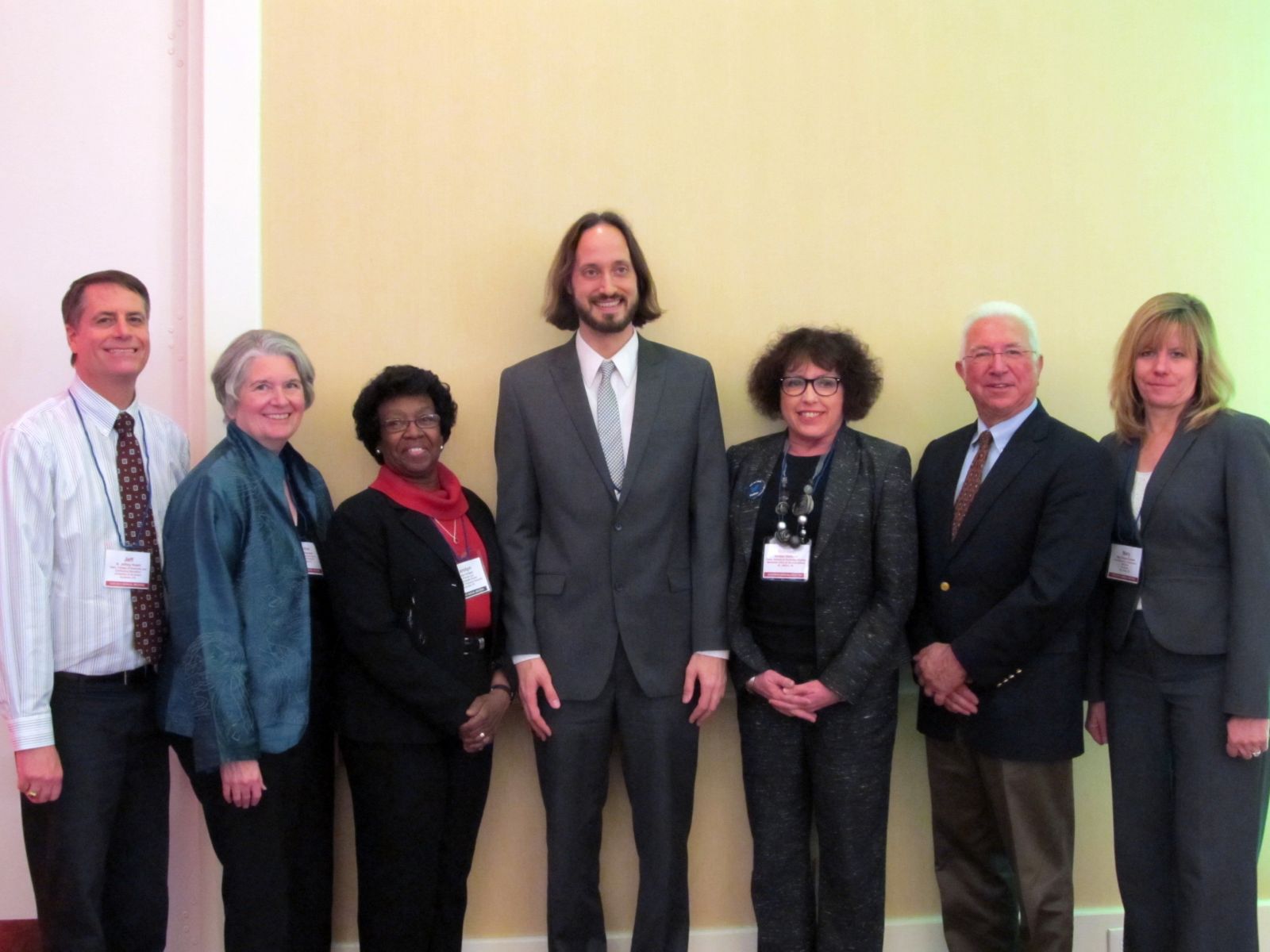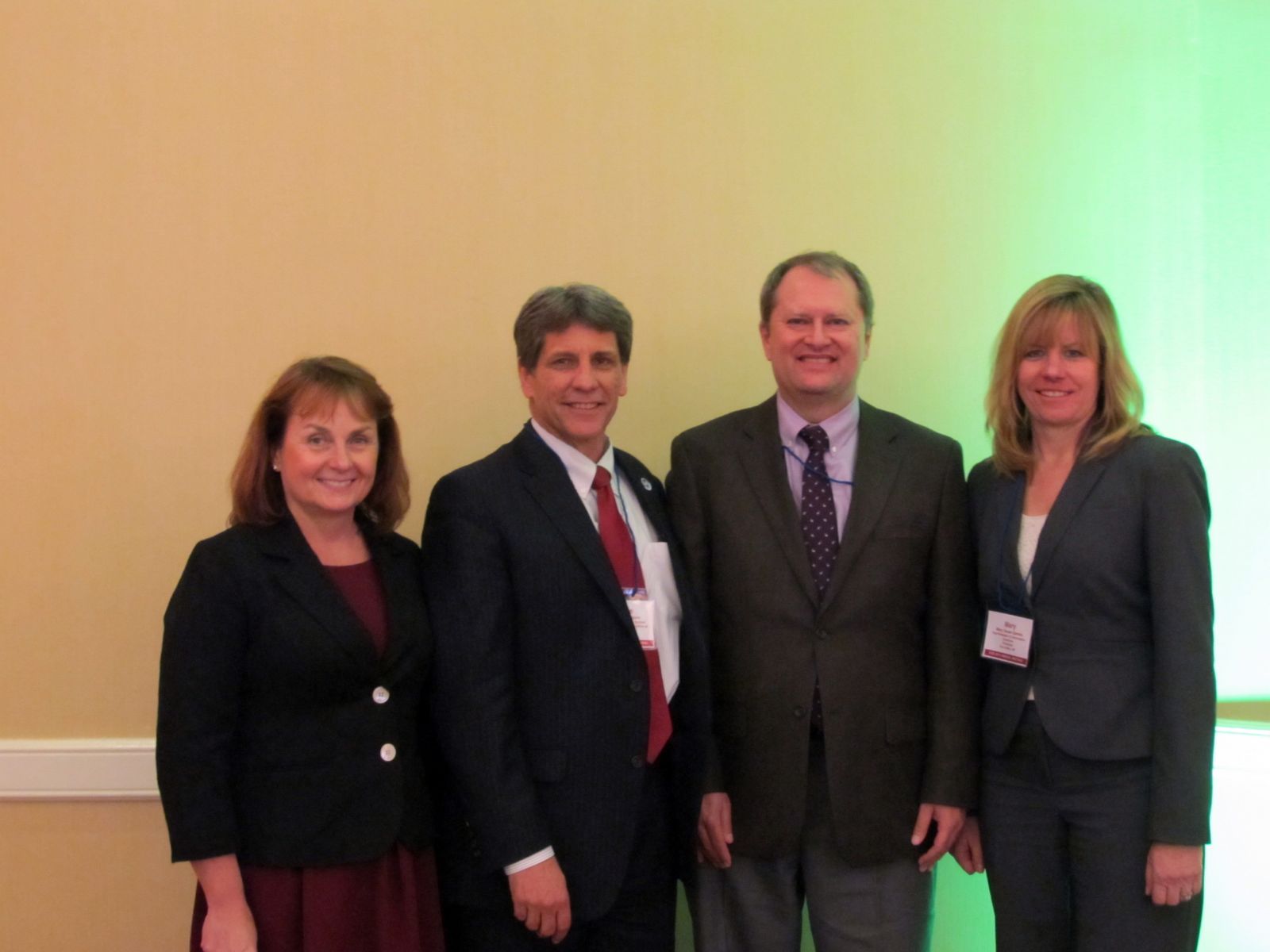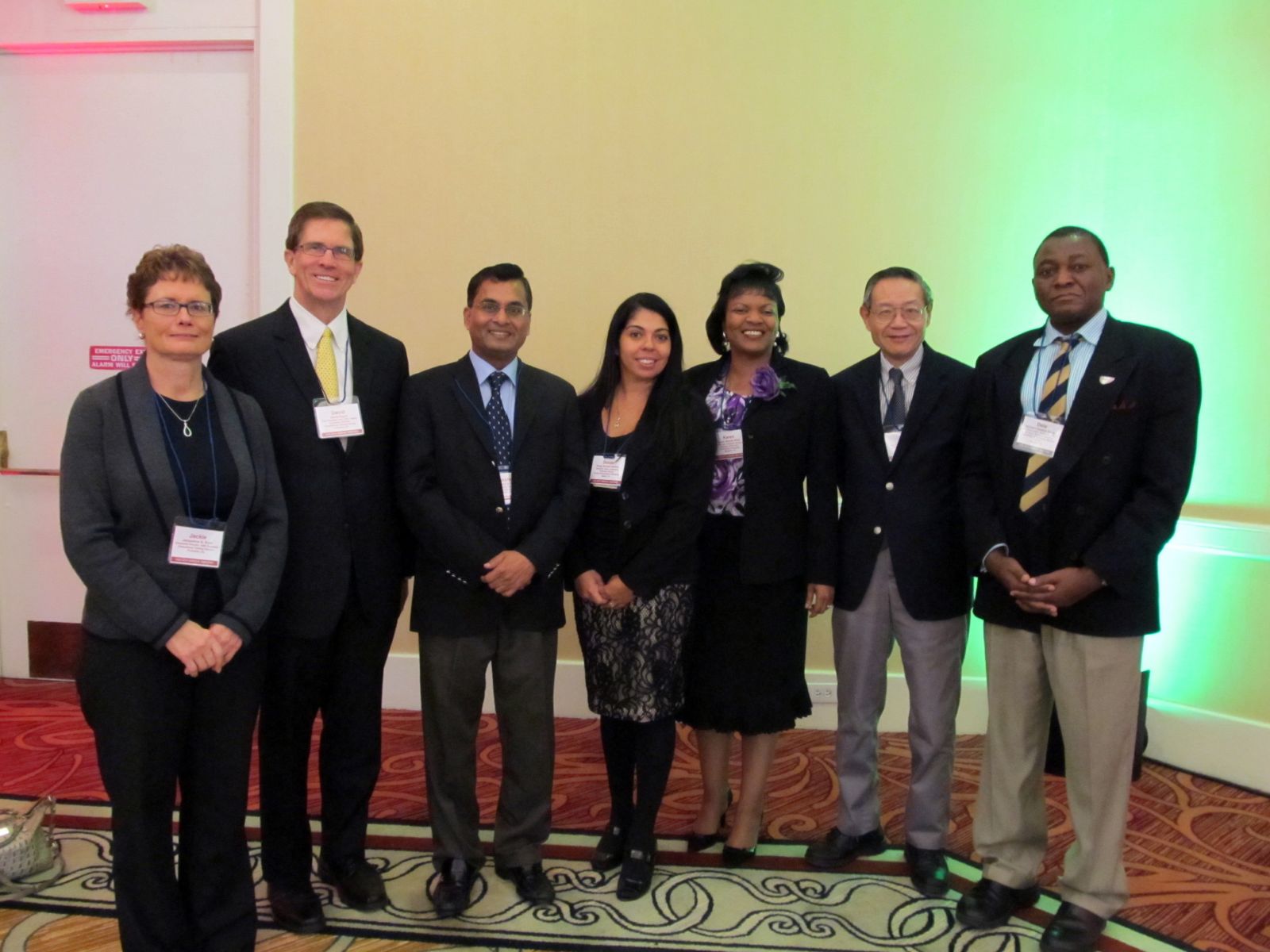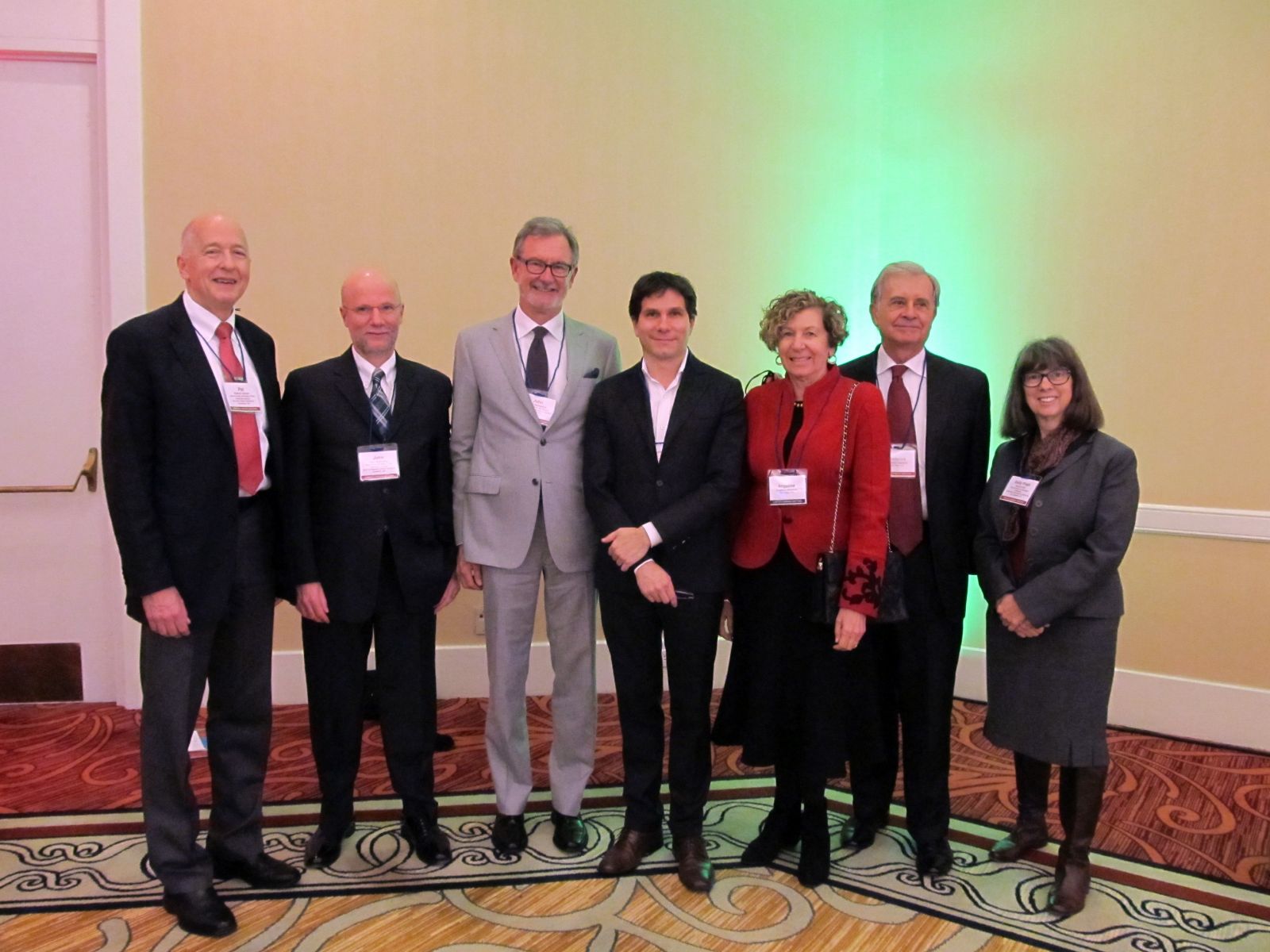You are on CGS' Legacy Site.
Thank you for visiting CGS! You are currently using CGS' legacy site, which is no longer supported. For up-to-date information, including publications purchasing and meeting information, please visit cgsnet.org.
Newsroom
In the newsroom, stay informed about the Council's activities with frequent updates and press coverage.
A recap of the 53rd Annual Meeting of the Council of Graduate Schools discusses some of the pressing challenges facing graduate education, including the role of institutions in promoting diversity, the impacts of the new healthcare law, and a project to study the feasibility of tracking PhD career outcomes.
CGS President Debra W. Stewart writes to The Chronicle to point out some of the important initiatives within the graduate community that have for years been working to improve the preparation of graduate students for a wider range of careers.
CGS announces a project to study the feasibility of tracking PhD career outcomes, with funding support from the Mellon and Sloan foundations.
Washington, DC – The Council of Graduate Schools (CGS) Board of Directors has announced its officers for the 2014 term.
Dr. James Wimbush, Dean of The University Graduate School, Indiana University, became the 2014 CGS Board Chair at the conclusion of the annual meeting. Dr. Wimbush has served as the graduate dean at IU since 2006 and earlier this year was also named Vice President for Diversity, Equity, and Multicultural Affairs. He has been a professor of business administration at IU since 1991. Nationally, Dr. Wimbush has worked to advance graduate education by serving in a variety of leadership positions, including an appointment on the joint Commission on Pathways through Graduate School and Into Careers, appointed by CGS and the Educational Testing Service. As an acknowledged national authority on human resources management, Wimbush has published numerous articles and book chapters related to ethics in employment settings. Dr. Wimbush earned his PhD in management and a master’s degree in human resources management and industrial and labor relations from Virginia Tech.
“CGS is excited and honored to have Dean Wimbush’s expertise at this critical point in the development of graduate education,” said CGS President Debra W. Stewart. “His distinguished leadership in a range of areas essential to CGS’s mission—from enhancing U.S. competitiveness through graduate education and research, to promoting diversity in graduate programs—will serve CGS well in 2014.”
The new Chair-elect is Barbara Knuth, Vice Provost and Dean of the Graduate School at Cornell University. She will serve in this role in 2014 and will become the board chair at the conclusion of the 2014 Annual Meeting. In her role at Cornell since 2010, Knuth has enhanced the Graduate School’s professional development program to focus on supporting students to work effectively with their graduate committees and to foster transferable skills relevant to academic and non-academic career paths. Since she became dean, all graduate degree programs have articulated specific learning outcomes and have implemented assessment plans focused on program improvement. Knuth joined the Cornell faculty in 1986 as an assistant professor of natural resource policy. She holds a bachelor of philosophy degree in interdisciplinary studies, a bachelor’s in zoology, and a master’s in environmental science from Miami University, and a PhD in fisheries and wildlife sciences from Virginia Tech.
Beginning three-year terms on the board on January 1 are Karen Butler-Purry, Associate Provost for Graduate Studies at Texas A&M, John (Jay) Doering, Dean, Faculty of Graduate Studies at the University of Manitoba, and Christine Ortiz, Dean for Graduate Education at the Massachusetts Institute of Technology.
CGS is governed by a 12-member Board of Directors drawn from member institutions. Board members serve for set terms. Robert Augustine, Dean of the Graduate School at Eastern Illinois University, will remain on CGS’s Executive Committee for one year as immediate past chair.
The Council of Graduate Schools (CGS) is an organization of over 500 institutions of higher education in the United States and Canada engaged in graduate education, research, and the preparation of candidates for advanced degrees. Among U.S. institutions, CGS members award 92% of the doctoral degrees and 78% of the master’s degrees.* The organization’s mission is to improve and advance graduate education, which it accomplishes through advocacy in the federal policy arena, research, and the development and dissemination of best practices.
* Based on data from the 2012 CGS/GRE Survey of Graduate Enrollment and Degrees
Washington, DC – The Council of Graduate Schools / ProQuest Distinguished Dissertation Awards, the nation’s most prestigious honor for doctoral dissertations, were presented to Austin Mason and Valorie Salimpoor at an awards ceremony during the CGS 53rd Annual Meeting. Dr. Mason completed his PhD in history at Boston College in 2012. Dr. Salimpoor earned her PhD in psychology at McGill University in 2013.
Bestowed annually since 1982, the awards recognize recent doctoral recipients who have already made unusually significant and original contributions to their fields. ProQuest, an international leader in dissertation archiving, discovery and access, sponsors the awards and an independent committee from the Council of Graduate Schools selects the winners. Two awards are given each year, rotating among four general areas of scholarship. The winners receive a certificate, a $2,000 honorarium, and funds for travel to the awards ceremony.
“The scholars selected to receive the 2013 awards have found new ways to combine research technologies and interdisciplinary fields, making remarkable contributions to their research areas,” said Mary Sauer-Games, ProQuest Vice President of Information Solutions. “ProQuest is honored to highlight their dissertations as exemplary works of doctoral study.”
The 2013 Award in humanities was presented to Dr. Mason for “Listening to the Early Medieval Dead: Religious Practices in Eastern Britain, 400–900 CE.” His interdisciplinary dissertation research uses methodologies from archeology and history along with the technology of geographic information systems (GIS) to reconstruct life in first-millennium Britain. As a prime example of ‘digital humanities’ research, the project uses GIS technology to reinterpret the way graves were sited and positioned in the mortuary rituals of pagans and Christians during the period. Dr. Mason is currently a tenure-track faculty member at the University of Minnesota, Twin Cities.

Photo caption: The 2013 CGS/ProQuest Distinguished Dissertation Awards. From left to right: Jeff Welsh, University of Scranton (selection committee member); Jeannine Blackwell, University of Kentucky (selection committee member); Carolyn Hodge, University of Tennessee, Knoxville (selection committee chair); Austin Mason, winner, 2013 Distinguished Dissertation in the Humanities; Noreen Golfman, Memorial University (selection committee member); Charles Caramello, University of Maryland, College Park (selection committee member); Mary Sauer-Games, ProQuest/UMI
Dr. Salimpoor received the 2013 Award in biological and life sciences for her dissertation, “Music, Emotion, and the Reward System: Investigations with (11C) raclopride Positron Emission Tomography (PET), functional Magnetic Resonance Imaging (fMRI) and Psychophysiological Methods.” Her research examines the dopamine response in the context of positive emotional responses to musical passages that elicit “chills.” The project shows the distinct brain circuitry responsible for the anticipation and the experience of the chills, which the brain perceives as pleasure. Dr. Salimpoor is currently a postdoctoral fellow at Rotman Research Institute in Toronto.

Photo caption: The 2013 CGS/ProQuest Distinguished Dissertation Awards. From left to right: Karen Colley, University of Illinois at Chicago (selection committee member); Steven Matson, University of North Carolina at Chapel Hill (selection committee chair); John Kiss, University of Mississippi (selection committee member); Mary Sauer-Games, ProQuest/UMI. Not pictured, Valorie Salimpoor, winner, 2013 Distinguished Dissertation in the Biological and Life Sciences.
More information about the CGS / ProQuest Distinguished Dissertation Award is available at www.proquest.com/go/scholars or at www.cgsnet.org.
About the Council of Graduate Schools
The Council of Graduate Schools (CGS) is an organization of over 500 institutions of higher education in the United States and Canada engaged in graduate education, research, and the preparation of candidates for advanced degrees. Among U.S. institutions, CGS members award 92% of the doctoral degrees and 78% of the master’s degrees.* The organization’s mission is to improve and advance graduate education, which it accomplishes through advocacy in the federal policy arena, research, and the development and dissemination of best practices.
* Based on data from the 2012 CGS/GRE Survey of Graduate Enrollment and Degrees
About ProQuest (www.proquest.com)
ProQuest connects people with vetted, reliable information. Key to serious research, the company’s products are a gateway to the world’s knowledge including dissertations, governmental and cultural archives, news, historical collections and ebooks. ProQuest technologies serve users across the critical points in research, helping them discover, access, share, create and manage information.
The company’s cloud-based technologies offer flexible solutions for librarians, students and researchers through the ProQuest®, Bowker®, Dialog®, ebrary® and EBL® businesses – and notable research tools such as the Summon® discovery service, the ProQuest Flow™ collaboration platform, the Pivot™ research development tool and the Intota™ library services platform. The company is headquartered in Ann Arbor, Michigan, with offices around the world.
Contacts:
Julia Kent, CGS
(202) 461-3874
jkent@cgs.nche.edu
Tom Ewing, ETS
(609) 683-2058
tewing@ets.org
Washington, DC – The fifth annual “ETS/CGS Award for Innovation in Promoting Success in Graduate Education: From Admission through Completion” was presented to Florida International University (FIU) during the 53rd Annual Meeting of the Council of Graduate Schools (CGS). The award is sponsored by CGS and Educational Testing Service (ETS). Dr. Lakshmi Reddi, Dean of the University Graduate School, accepted the award on behalf of FIU.
The award recognizes promising, innovative proposals to enhance student success and degree completion at the master’s or doctoral level, while promoting inclusiveness. The winning institution is selected on the strength of its proposal to meet the award’s goals and to serve as a model for other schools and receives a two-year, $20,000 matching grant.
FIU’s winning proposal establishes a new community of doctoral scholars to support the professional development and timely completion of underrepresented minority (URM) PhD students. Under the title Academy of Graduates for Integrative Learning Experiences (AGILE), the new program brings together the expertise of centers and offices throughout campus, which provide professional training modules, academic planning, and other forms of student support. AGILE emphasizes peer-mentoring, leadership, community service and engagement, and interdisciplinary communication.
The selection committee noted that, as an institution with high URM graduate enrollment, FIU has an opportunity through AGILE to discern problems contributing to minority PhD attrition and evaluate strategies for improving student success.
“Students from URM backgrounds are vital to our community at FIU,” said Lakshmi Reddi, Dean, University Graduate School at Florida International University. “We are excited to support them with a new model for PhD student development that engages a broad group of campus organizations and graduate leaders. Most of all, we are eager to give students themselves greater opportunities to mentor and learn from one another as they explore their leadership potential.”

Photo caption: The 2013 ETS/CGS Award. From left to right: Jackie Briel, ETS; David Payne, ETS; Lakshmi Reddi, Florida International University; Sonja Montas-Hunter, Florida International University; Karen Weddle-West, University of Memphis (selection committee chair); John Ho, The University at Buffalo, SUNY (selection committee member); H. Dele Davies, University of Nebraska Medical Center (selection committee member)
Following the two-year funding period, AGILE will be sustained as a permanent program thanks to the commitment of FIU administration, the University Graduate School, and participating centers and offices.
“Today’s doctoral students represent the best and brightest minds in their fields,” said David G. Payne, Vice President and COO of ETS’s Higher Education Division. “Ensuring the success of minority students throughout the PhD pipeline is essential to achieving an inclusive faculty and graduate community. ETS is pleased to support FIU in this innovative approach to improving degree completion rates for minority doctoral students.”
“CGS recognizes the potential of the AGILE program and we are delighted that FIU will be sharing new promising practices with the graduate community,” said CGS President Debra W. Stewart. “This program will move us closer to the goal of closing the achievement gap for the benefit of all PhD students.”
About ETS
At ETS, we advance quality and equity in education for people worldwide by creating assessments based on rigorous research. ETS serves individuals, educational institutions and government agencies by providing customized solutions for teacher certification, English language learning, and elementary, secondary and post-secondary education, as well as conducting education research, analysis and policy studies. Founded as a nonprofit in 1947, ETS develops, administers and scores more than 50 million tests annually — including the TOEFL® and TOEIC® tests, the GRE® tests and The Praxis Series™ assessments — in more than 180 countries, at over 9,000 locations worldwide. www.ets.org
About CGS
The Council of Graduate Schools (CGS) is an organization of over 500 institutions of higher education in the United States and Canada engaged in graduate education, research, and the preparation of candidates for advanced degrees. Among U.S. institutions, CGS members award 92% of the doctoral degrees and 78% of the master’s degrees.* The organization’s mission is to improve and advance graduate education, which it accomplishes through advocacy in the federal policy arena, research, and the development and dissemination of best practices.
* Based on data from the 2012 CGS/GRE Survey of Graduate Enrollment and Degrees
Contact:
Julia Kent
(202) 223-3791
jkent@cgs.nche.edu
Washington, DC – The Council of Graduate Schools (CGS) has awarded the 2013 Gustave O. Arlt Award in the Humanities to Dr. Christian Kleinbub, Associate Professor of History of Art at The Ohio State University. The awards ceremony was held during the CGS 53rd Annual Meeting.
The Arlt Award is given annually to a young scholar-teacher who has written a book deemed to have made an outstanding contribution to scholarship in the humanities. Dr. Kleinbub becomes the award’s 42nd recipient for his book, Vision and the Visionary in Raphael (The Pennsylvania State University Press, 2011). He received his PhD in Art History from Columbia University in 2006.
Dr. Kleinbub’s book explores the mastery of Raphael’s paintings and offers new appreciation for the transformative affect his work had on Renaissance art. The manifestation of heavenly beings and prophetic visions to human eyes were a central theme for Raphael. In the book, Kleinbub analyzes the supernatural scenes in Raphael’s paintings in the context of the naturalistic style for which Renaissance artists are known. He reveals often-overlooked details that bring to life the fascinating contrasts hidden within some of the world’s most recognizable paintings.
Vision and the Visionary was selected to receive the Arlt Award for the impact the book has had since its publication. Nominators praised the book for advancing the discourse on Renaissance art among students, academics, critics, and art aficionados alike.

Photo caption: The 2013 Gustave O. Arlt Award. From left to right: Pat Osmer, The Ohio State University (nominator); John McCarthy, University of Massachusetts Amherst (selection committee member); John Stevenson, University of Colorado at Boulder (selection committee chair); Christian Kleinbub, winner, 2013 Arlt Award; Angelina Kleinbub; Frederick Kleinbub; Sally Pratt, University of Southern California (selection committee member)
Created in 1971, the Arlt Award honors the first president of CGS. The winner must have earned a doctorate within the past seven years from, and currently be teaching at, a North American university. Nominations are made by CGS member institutions and are reviewed by a panel of scholars in the field of competition, which rotates annually among seven disciplines within the humanities. This year’s field was The Arts (Art History/Criticism/Conservation and Music). The winner receives a $1,000 honorarium, a certificate, and travel to the awards ceremony.
The Council of Graduate Schools (CGS) is an organization of over 500 institutions of higher education in the United States and Canada engaged in graduate education, research, and the preparation of candidates for advanced degrees. Among U.S. institutions, CGS members award 92% of the doctoral degrees and 78% of the master’s degrees.* The organization’s mission is to improve and advance graduate education, which it accomplishes through advocacy in the federal policy arena, research, and the development and dissemination of best practices.
* Based on data from the 2012 CGS/GRE Survey of Graduate Enrollment and Degrees
Contact:
Nate Thompson
(202) 223-3791
nthompson@cgs.nche.edu
Washington, D.C. — The Council of Graduate Schools (CGS) today announced a new initiative to address the need for tracking the career pathways of PhD holders across broad fields of graduate study. With input from its member institutions, CGS will assess the feasibility of a larger project to develop and enhance processes for tracking the career pathways of PhD alumni of STEM, humanities and social science graduate programs.
A new grant from the Mellon Foundation will support the council’s work to understand distinctive features of the employment outcomes of PhD holders in the humanities and social sciences, and research methods appropriate to their study. CGS will simultaneously, and comparatively, study similar questions with respect to science, technology, engineering, and mathematics (STEM) fields and economics with support from the Alfred P. Sloan Foundation, continuing two earlier grants to study STEM graduate education. The combined one-year study will determine the potential value of implementing a long-term project recommending best practices in tracking the career pathways of PhD-holders.
At the Council of Graduate Schools’ Annual Meeting in San Diego today, CGS President Debra W. Stewart noted that the project is the first of its kind. “This project addresses a major gap in the understanding of PhD career outcomes, one of the key outcomes of graduate education that has not yet been measured on a large scale across a broad spectrum of fields. While past and current efforts to map the career pathways of PhD holders have furthered our understanding of this issue, this project addresses the specific need for program-level data, which will most effectively allow institutions to improve their programs, and students to make more informed decisions.”
The current lack of reliable information beyond first-job data means that pathways into careers are not always transparent to prospective or current graduate students, faculty, employers, or graduate program administrators. Each of these groups stands to gain from a fuller understanding of PhD career pathways, including the extent of PhD careers outside of the academy.
Through direct grants to universities and by underwriting research, the Andrew W. Mellon Foundation has long supported efforts to improve the intellectual and professional outcomes of doctoral education in the humanities. In recent years, the Foundation has assisted universities and professional organizations in launching initiatives that broaden the preparation of PhD students for a variety of professional trajectories in as well as outside the academy.
The Sloan Foundation, too, has had a longstanding interest in graduate education and workforce development, related to its core commitment to education and basic research in STEM fields. Sloan has partnered with CGS on studies of the career outcomes of those graduating with Professional Science Master’s (PSM) degrees; this new model for graduate education has gained traction, with over 300 PSMs now established in universities across the country.
The project will include a survey of over 500 universities on their current practices for tracking doctoral program alumni, a white paper exploring all that is currently known about the demand for career tracking for PhDs, and a two-day intensive workshop of researchers, graduate deans, PhD holders and other experts on the subject of tracking career pathways.
A final report on the study will be shared with the graduate community in December 2014.
The Council of Graduate Schools (CGS) is an organization of over 500 institutions of higher education in the United States and Canada engaged in graduate education, research, and the preparation of candidates for advanced degrees. Among U.S. institutions, CGS members award 92% of the doctoral degrees and 78% of the master’s degrees.* The organization’s mission is to improve and advance graduate education, which it accomplishes through advocacy in the federal policy arena, research, and the development and dissemination of best practices.
* Based on data from the 2012 CGS/GRE Survey of Graduate Enrollment and Degrees
The 2013 CGS International Graduate Admissions report is referenced in a Wall Street Journal article that notes continued growth in international students at the undergraduate level.
Indian students largely drove the growth of new foreign enrolment in U.S. graduate schools this year with a 40 percent surge, while growth from China slowed to 5 percent, according to the latest CGS International Graduate Admissions survey.




